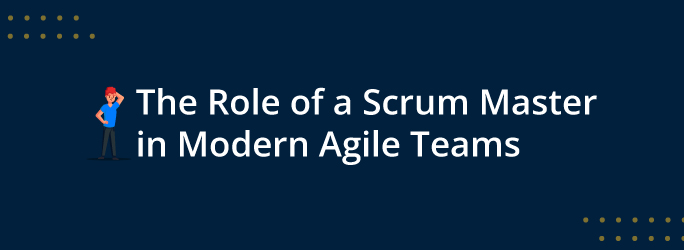The use of Agile methodology goes beyond software development and project management. Today, organisations worldwide are using Agile methodologies to carry out diverse operations. Agile frameworks are improving the operations of industries like finance, construction, healthcare, event planning companies, and manufacturing. Among commonly used Agile methodologies like Lean, Kanban, Extreme Programming, and Scrumban, Scrum is the top choice of organisations. Scrum is mostly preferred by organisations for its flexibility, simplicity, and capability to deliver excellent results.
The Scrum Masters rely on the Scrum project management framework to ensure the tasks performed by Scrum team members are in complete alignment with Agile principles, practices, and values. Read on to understand what are the roles played by a Scrum Master in an Agile setting.
Who is a Scrum Master?
A Scrum Master plays the role of a guide and facilitator within the development team. These professionals should ensure the tasks carried out by Scrum teams are in alignment with the Agile practices and principles. While traditional managers follow authoritarian leadership, Scrum masters follow a servant-leadership approach to coach team members. Scrum Masters also inspire team members to focus on a common goal. You can Improve your facilitation skills by enrolling in the Advanced Certified Scrum Master certification.
What is the Role of a Scrum Master?
- Coaching the Team: A Scrum Master helps team members discover what are Scrum principles and values. Also, these professionals can help employees understand how these principles are applied to solve organisational challenges. They act as a mentor for teams. Also, they help Scrum teams to self-organize, adapt to changes, and improve their skills when necessary.
- Improves Communication: A Scrum Master should ensure the chain of communication among the Product Owner, Stakeholders, and team members is clear.
- Scrum Process: These professionals use their facilitation skills to simplify the Scrum process. Scrum Masters should find out if team members are following the Scrum procedures properly.
Most importantly, Scrum Masters should be able to conduct Scrum ceremonies like Daily Standup, Sprint Retrospective, Sprint Review, and Sprint Planning.
You can register for the CSM certification training to learn more about these processes.
- Improve Transparency: The Scrum Master should be capable of tracking the team’s progress and ensuring the project’s progress is visible to stakeholders. It is usually done by ensuring a visible burn-down chart and product backlog are maintained.
- Focus: The Scrum Master ensures his/her team is protected from unnecessary interruptions and external distractions. This ensures the Scrum team can deliver high value in real-time and stay focused on their work.
- Implement Best Project Management Techniques: The Scrum Master can be held accountable for onboarding project teams and offering a clear product vision. They ensure that the information exchange and communication between the project team and external groups is clear. Besides, these professionals foster a culture of agility and continuous learning in an organisation by monitoring project progress and providing timely feedback.
- Eliminate Challenges: A Scrum Master is responsible for finding roadblocks obstructing team performance and taking necessary steps to remove them. Scrum Masters ensure team members can operate seamlessly. Besides, they use facilitation skills to resolve conflicts and address technical challenges.
Conclusion
In the context of modern Agile practices, Scrum Masters are gaining popularity for their excellent facilitation skills, such as clear communication, coaching and leading teams, removing obstacles, and fostering collaboration. Scrum Masters help organisations thrive in the ever-changing technical landscape.





